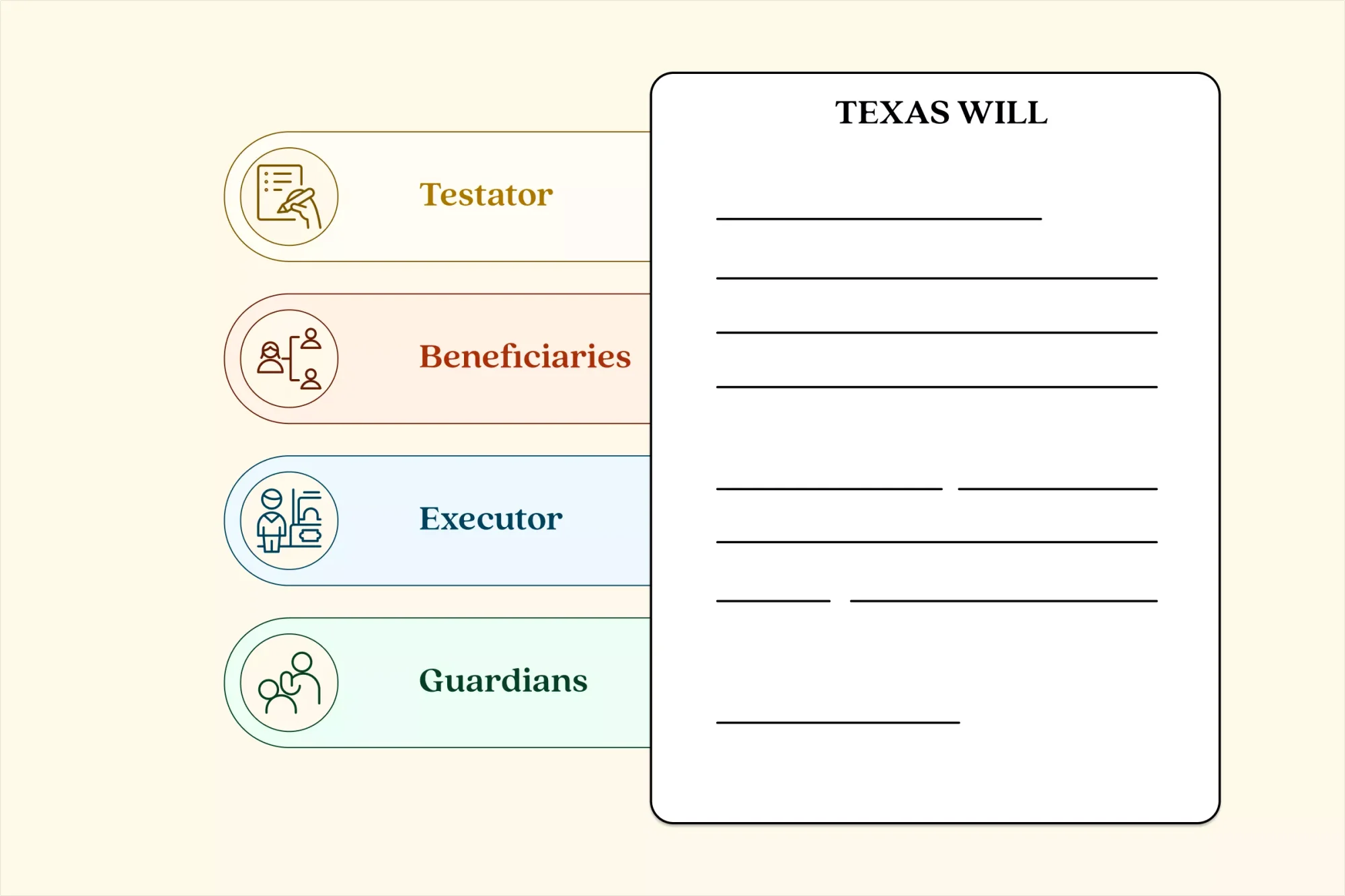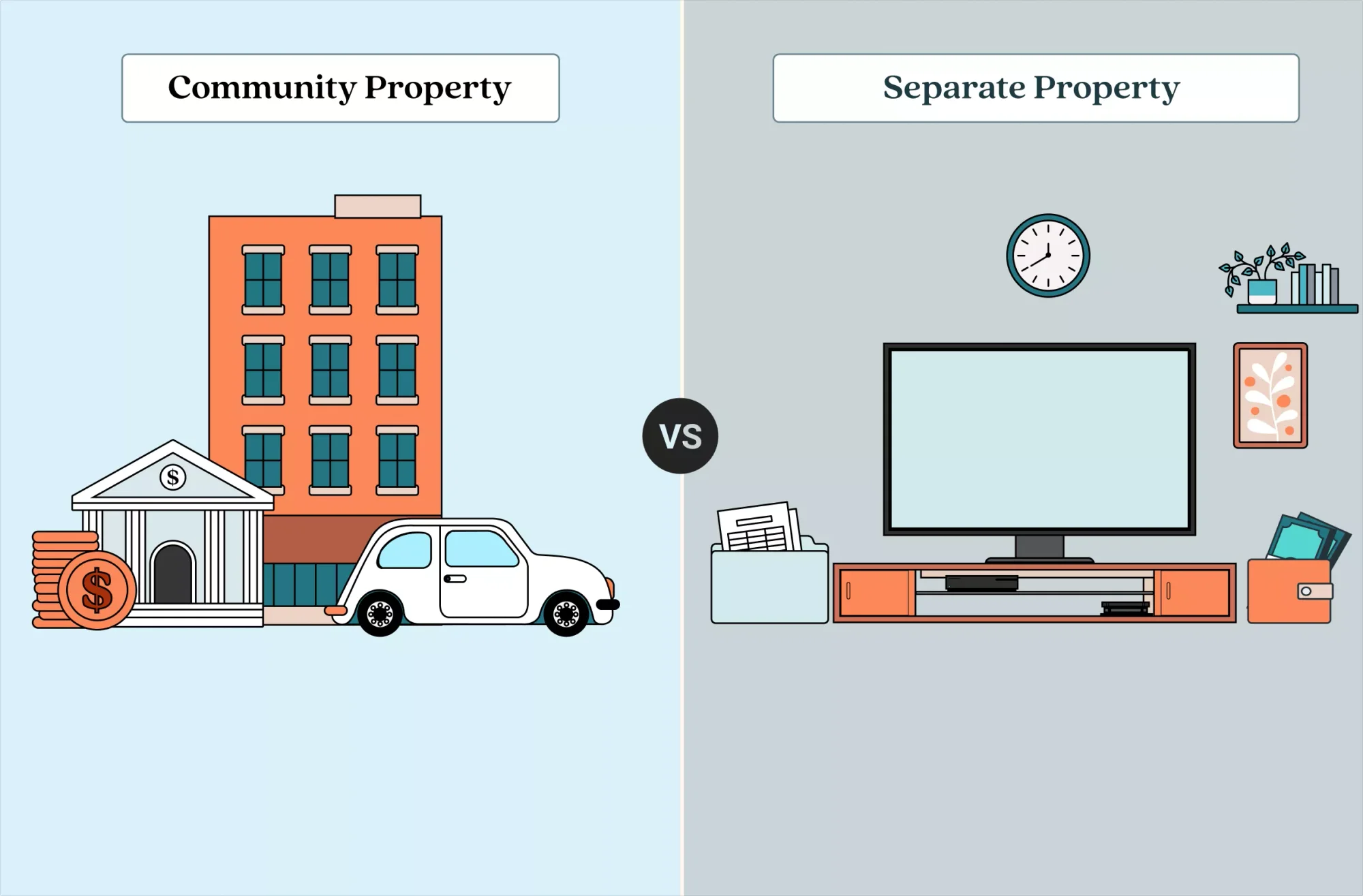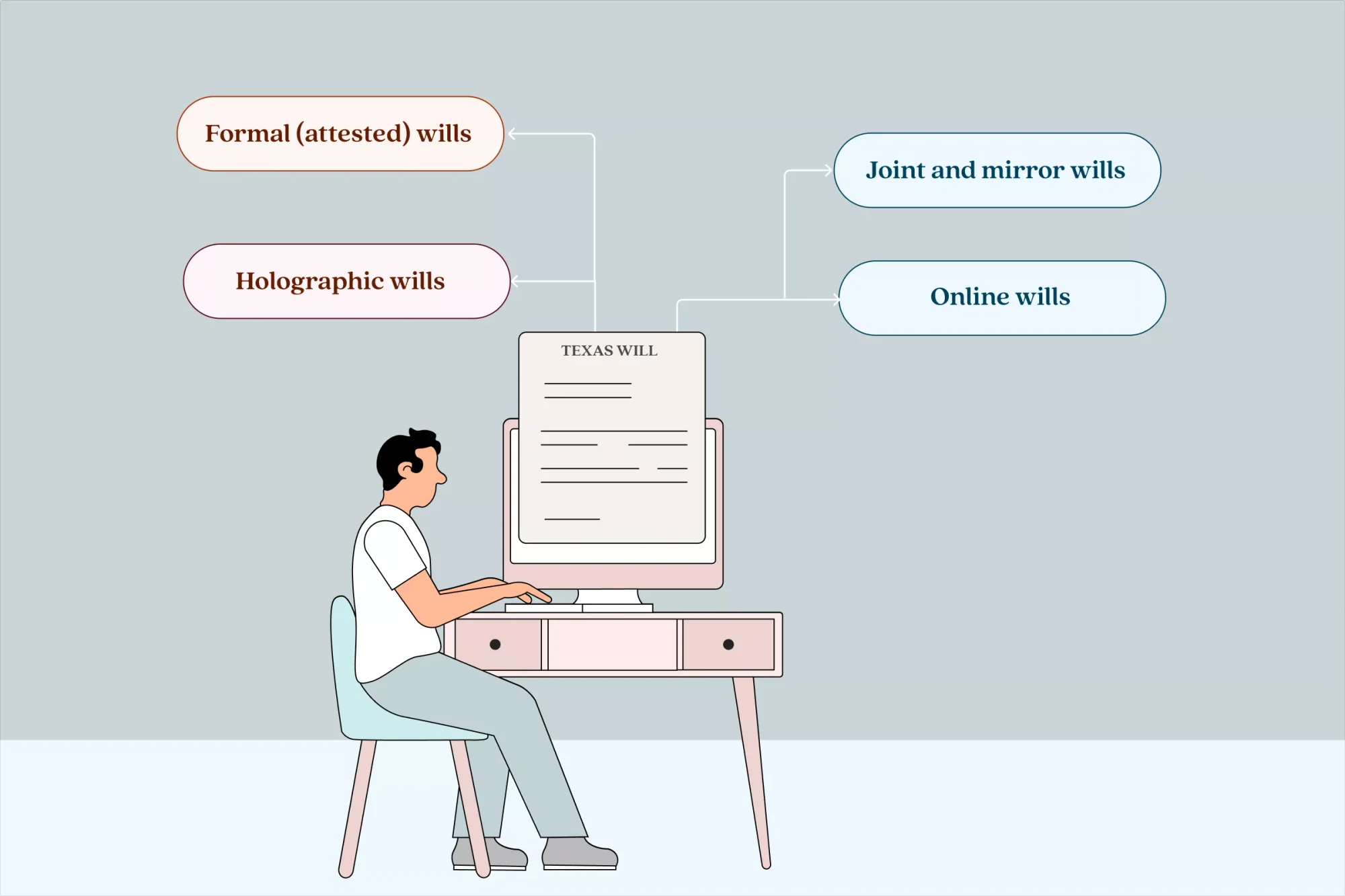You’ve worked hard to build your estate, but have you thought about what will happen when you die? Creating a Texas last will and testament is crucial for ensuring your wishes are followed and your loved ones are provided for after your death.
Especially in Texas, where unique community property laws can complicate inheritance, having a will is even more critical. More importantly, if there are strong preferences about medical decisions or funeral arrangements, a will in Texas ensures those wishes are clearly communicated.
This article will guide you through the essentials of wills in Texas, including the legal requirements, the roles involved, the types of wills recognized, and the probate process. Whether you’re considering a do-it-yourself approach or exploring online solutions, understanding these elements will help you make informed decisions about your estate planning.

Key takeaways for a Texas last will and testament
- A Texas last will and testament requires the signature of two witnesses who are not named in the will.
- A Texas will does not need to be notarized, but notarization is recommended.
- Texas does not impose estate or inheritance taxes. Still, federal estate tax exemption thresholds apply, and it’s wise to seek legal counsel if you have a complex estate or need a self-proving will.
Basics of a Texas last will and testament
A Texas last will and testament is a legal document that outlines your wishes regarding the distribution of your property, the guardianship of any minor children, and the appointment of an executor after your death, following Texas law. A valid will in Texas must be signed by two witnesses who are at least 14 years old. Although notarization is not mandatory, it is a common practice.
Once the will has been executed, it is prudent to:
- Keep the signed original in a safe location
- Let someone trustworthy know where it is
- Make duplicates
- Ensure the executor(s) and important beneficiaries know its location
If you don't have a legally recognized will or testament in Texas, your assets will be distributed according to intestacy laws. However, the order of distribution to living relatives may not line up with your wishes, so it’s best to lay it out in a last will. Plus, a will allows you to exclude heirs and designate any individuals as beneficiaries to inherit your possessions.

What roles are involved in a Texas will?
You will need to identify a few key roles in your Texas last will and testament. It’s important to understand each role so you can choose the right person or people to fulfill them.
- Testator: This is the person who creates the will. In Texas, you must be at least 18 years old and of sound mind to create a legal will. As the testator, you have complete control over how your assets are distributed and who handles your affairs.
- Beneficiaries: These are the people, organizations, or charities who will receive your assets. Beneficiaries can include family members, friends, religious organizations, or any entity you choose. For example, you might leave your house to your spouse, your car to your daughter, and a portion of your savings to your favorite charity.
- Executor: Also called a personal representative in Texas, the executor manages your estate through the probate process. In Texas, your executor pays debts, files tax returns, and distributes assets according to your will. Choose someone trustworthy and organized with good financial judgment—perhaps your spouse, adult child, or a close friend.
- Guardians: If you have minor children, you can name guardians who will care for them if both parents die. This might be your siblings, parents, or close family friends.

Do you need a last will and testament in Texas?
Although a Texas last will and testament is not legally required, without a will, Texas state laws will determine the distribution of an estate’s assets. This set of laws is known as the “Texas intestacy law,” which governs standard asset distribution. It takes a one-size-fits-all approach—the outcome under intestacy rules may not coincide with your wishes.
Common problems include:
- Unintended beneficiaries. Your estranged sibling might inherit property you’d prefer to leave to a close friend or charity.
- Stepchildren exclusion. Stepchildren you raised as your own receive nothing unless you legally adopted them before your death. Under Texas Estates Code Chapter 201 Section 201.054, an adopted child is regarded as the child of the adoptive parent for purposes of inheritance under the state intestacy laws.
- Unmarried partners. Your long-term partner may receive nothing, regardless of your relationship length or shared property.
- Business complications. Your business might end up owned by multiple family members who can't agree on management decisions.
- One of the most significant benefits of a last will and testament in Texas is that it allows the testator to select the executor of the estate—an important decision, as the executor will be in charge of carrying out the wishes contained in the will. You may feel more peace of mind knowing that your estate is in good hands after your death.
Why all adults in Texas can benefit from a will
A common misconception is that only the elderly or wealthy need a will. In reality, every adult who is 18 years or older in Texas, regardless of income or family size, should consider having at least a simple Texas will. Let’s take a look at some of the common groups of people and why it’s important to set up an estate plan.
1. Young adults in their 20s and 30s
Young adults in their 20s and 30s need wills even if they think they don’t own much. Consider a 28-year-old software engineer who has recently purchased a condo and accumulated some savings and retirement benefits. She is unmarried and has no children, but she is close to her younger sibling and would like her sibling to inherit her condo. Without a will, state law would generally direct her assets to her parents, not her siblings. By creating a will, she can ensure her wishes are carried out and her sibling receives the inheritance as intended.
2. Parents with minor children
Parents with minor children should have a will, regardless of their financial situation. Without a will, Texas courts decide who will raise your children, and this decision might not align with your preferences. For instance, you may be more comfortable with one of your siblings raising your child instead of your parents, or you may wish to name a friend as a guardian to your child if you have no family.
3. Homeowners and property owners
Home and property owners can use a will to control who inherits their property. Real estate should be distributed according to your wishes, and not left to the Texas intestacy laws.
4. Business owners and professionals
Business owners and professionals may want a will to address their business interests, professional relationships, and industry-specific assets. For example, a small cafe owner wants to create a will and hand over the responsibilities to the cafe’s head chef and the operational responsibilities to the family after her death.
5. People who wish to donate to charities
People with strong charitable inclinations need wills to ensure their valued organizations receive intended donations. Without a will, your entire estate goes to family members, who may or may not choose to donate to the charities you supported during your lifetime.

How does a Texas will help prevent family disputes?
A properly drafted will in Texas serves as your voice after death, eliminating guesswork about your intentions and providing clear instructions for your family and the courts.
Provides clarity on contentious topics
- Sentimental items and personal property. Family disputes often center on items with little monetary value but high emotional significance. For instance, your grandmother’s jewelry, your father’s tools, family photos, or a beloved pet can cause bitter arguments. Specific instructions can exactly mention who receives each meaningful item, preventing fights over possessions that can’t be easily divided.
- Unequal distributions. Sometimes, you may want to leave different monetary allocations to different family members. Perhaps one child has special needs requiring more financial support, or another child has already received substantial help with education or home purchases. A will allows you to explain these decisions, helping family members understand your reasoning.
- Blended family dynamics. Second marriages with children from previous relationships create complex family dynamics. A will can balance the needs of your current spouse with your obligations to children from earlier marriages. You might establish testamentary trusts that provide for your spouse during their lifetime while preserving assets for your children’s eventual inheritance.
Safeguards minor children
A will allows you to name guardians for your minor children, ensuring they’re raised by people you trust who share your values. You can name different guardians for personal care and financial management if you prefer separating these responsibilities.
You can also include guidance for your chosen guardians about your children’s education, religious upbringing, extracurricular activities, and values. While guardians aren’t legally bound by these preferences, they may appreciate knowing your wishes for the children’s upbringing.

Community property vs. separate property in Texas
Texas is one of nine community property states in the United States. This classification fundamentally affects how property is owned during marriage and distributed after death. Community property law is very complicated, so it is important to talk to an attorney if you need legal advice.
What is community property in Texas?
According to Texas Family Code Section 3.002, community property consists of the property acquired by either spouse during marriage, excluding separate property (property acquired before the marriage or by gift or inheritance). In general, this means that any property acquired by a couple during their marriage (with a few exceptions) is equally owned by both spouses.
Basically, this means each spouse has a 50% interest in all property assets acquired during the marriage. This applies even if only one spouse’s name appears on the title or deed. The spouses also have equal rights to manage community property. However, Texas law also allows for certain decisions to require mutual consent, such as selling the family home or making major financial decisions.
The fundamental principle of community property is that marriage creates an economic partnership where both spouses have an equal say, regardless of which spouse actually earned the income or made the purchase.
What assets are considered community property in Texas?
Community property ranges from salaries, wages, real estate, and other personal property purchased during marriage.
1. Income and wages
All salaries, wages, bonuses, commissions, and business income earned by either spouse during the marriage are community property. This includes:
- Regular paychecks from employment
- Overtime pay and bonuses
- Self-employment income
- Business profits that are acquired from the operational and functional work that is performed during the marriage
- Professional practice income
2. Real estate purchased during marriage
Any house, land, commercial property, or other real estate bought during the marriage, regardless of:
- Which spouse’s name is on the deed
- Which spouse provided the down payment
- Which spouse signed the mortgage
3. Vehicles and personal property
Cars, boats, motorcycles, furniture, electronics, jewelry, and other personal items purchased during marriage are community property. This includes:
- Family vehicles, even if only one spouse drives them
- Household furniture and appliances
- Electronics and entertainment systems
- Jewelry and clothing
- Sports equipment and hobby items
4. Investment and retirement accounts
Financial accounts and investments acquired during marriage are community property, including:
- 401(k) and 403(b) retirement accounts
- Individual Retirement Accounts (IRAs)
- Stock portfolios and mutual funds
- Bank accounts and certificates of deposit
- Life insurance policies with cash value
5. Business interests
If either spouse starts a business during marriage or acquires business interests, these are generally community property (although there are exceptions). This can include:
- Sole proprietorships
- Partnership interests
- Corporate stock
- Professional practices (medical, legal, accounting)
- Franchise ownership
We can help cover the essentials, plus healthcare and financial documents that go beyond naming beneficiaries.

What is separate property in Texas?
Separate property belongs exclusively to one spouse and is not subject to equal division or community property rules. However, proving separate property status requires clear documentation and careful management to avoid commingling with community property.
What assets are considered separate property in Texas?
According to the Texas Family Code, a few different categories of property can be considered separate property.
1. Property acquired before marriage. Any assets you owned before your wedding date remain your separate property. This includes:
- Real estate purchased before marriage
- Bank accounts established before marriage
- Vehicles owned before marriage
- Personal belongings and furniture
- Investment accounts and retirement funds accumulated before marriage
- Business interests owned before marriage
For example, if Jennifer owned a condominium in Austin before marrying David, that condo remains her separate property even after marriage, assuming she doesn’t commingle it with community property.
2. Gifts and inheritances. Inheritances and gifts acquired by one spouse during the marriage are separate property. This includes:
- Inheritances from family members or friends
- Gifts from third parties to one spouse specifically
- Gifts from one spouse to the other (with proper documentation)
- Bequests under wills or trust distributions
3. Personal injury recoveries. Payments from personal injuries received during the marriage are separate property, with one important exception: Any portion or compensation received by the injured person due to permanent disability or being incapacitated is community property. This includes:
- Settlement payments for personal injuries
- Court judgments for personal injury claims
- Insurance payments for personal injuries
- Workers’ compensation benefits for injuries

What is commingling of property in Texas?
Commingling occurs when separate property (owned individually before marriage, or received as a gift/inheritance) is mixed with community property (assets acquired during marriage). Once mixed, it becomes difficult to tell what belongs to whom, and Texas law may classify the entire asset as part of the community estate.
Below are some common commingling scenarios.
- Bank account mixing: Depositing separate property funds (like an inheritance) into a joint checking account used for household expenses.
- Real estate improvements: You owned a house before marriage (separate property), but used community funds for major renovations.
- Business growth: You owned a business before marriage, but it grows significantly during marriage due to the combined efforts of both spouses, either through labor or funds.
Here’s a practical example:
Consider Carlos Martinez, who owned a small auto repair shop worth $50,000 before marrying Elena. During their 10-year marriage, Carlos worked 60 hours per week building the business, while Elena managed the books and handled customer service. They also invested $30,000 of Elena’s salary into new equipment.
When Carlos dies, the business is worth $200,000. While Carlos originally owned the business as separate property, the community estate likely has a significant interest due to:
- Community labor (both spouses’ work during marriage)
- Community funds invested in equipment
- The increase in value due to community efforts
This situation would require legal analysis to determine how much of the business remains Carlos’s separate property versus community property. It’s always beneficial to consult an attorney to gain clarity and understanding on distinguishing your assets.
We can help cover the essentials, plus healthcare and financial documents that go beyond naming beneficiaries.

What happens if you die without a will in Texas?
If you die without a will in Texas, you’re considered to have died “intestate.” This means the state’s intestacy laws will decide how your estate is distributed. This is handled under the Texas Estates Code Title 2, Subtitle E, Chapter 201: Descent and Distribution, which follows a standard method based on your legal relationships. The state essentially steps in to write your will for you, but it may not align with your actual wishes or family circumstances.
Generally, the probate process involves filing a petition with the probate court and providing notice to potential heirs. The process becomes more complicated without a will because:
- The court must determine who your legal heirs are
- Family members may dispute their rightful shares
- An administrator must be appointed and bonded
In Texas probate, when someone dies without a will and the court appoints an administrator to manage the estate, the court often requires that administrator to obtain a probate bond (also called an administrator bond). This bond is a type of insurance policy that protects the estate’s beneficiaries and creditors from losses if the administrator mismanages or improperly distributes the estate’s assets. Being “bonded” means the administrator must purchase this bond, typically from a surety company, and file it with the court before starting their duties. If the administrator fails in their responsibilities—through fraud, negligence, or mismanagement—those harmed can make a claim against the bond for compensation.

What is the Texas intestate succession process?
In Texas, the surviving spouse and children will usually inherit all probate assets when someone dies without a will. However, the exact distribution depends on several key factors: your marital status, whether you have children, and the type of property you own.
The probate court will appoint an administrator (typically a family member) to handle your estate since you didn’t name an executor. This person will be responsible for gathering your assets, paying debts, and distributing property according to Texas intestacy laws.
How are your assets distributed according to intestacy laws?
The Texas estate code outlines who inherits your assets and in what order.
If you’re married with a surviving spouse and children
When you’re survived by both a spouse and children, the distribution becomes more complex.
- If all children are also children of the surviving spouse, the spouse inherits all community property.
- If you have children from another relationship, your children inherit your community property. The size of each child’s share depends on how many children you have and whether your spouse is also your children’s parent.
For community property (assets acquired during marriage), your spouse typically receives the entire community estate if all children are also your spouse’s children. However, if you have children from a previous relationship, they will inherit your community property share.
For separate property (assets owned before marriage or received as gifts/inheritance), if the person has one or more children or a descendant of a child, the surviving spouse takes one-third while the children receive the remaining two-thirds.
If you’re single with children
If you’re single, have children, and die without a will in Texas, your entire estate passes to your descendants. The property gets divided equally among your children, and if any child has predeceased you, their share goes to their own children (your grandchildren).
If you don’t have a spouse or children, but have parents and siblings
The estate passes to parents first, then siblings, nieces, nephews, and more distant relatives, following a detailed order set out in the Texas Estates Code.
If you have no immediate family members
If there are no spouses, children, parents, or siblings, the estate is divided between the maternal and paternal relatives (grandparents, aunts, uncles, cousins). If no heirs can be found, the estate escheats (passes) to the State of Texas
An example of an intestate succession hierarchy
Consider Sarah, an Austin resident who died without a will. She was married to John and had two children from her first marriage, plus one child with John. She owned a house purchased before her second marriage (separate property) and an investment account built during her marriage to John (community property).
Under Texas intestacy laws, Sarah’s one-half interest in the investment account would be split equally among Sarah’s three children. John would retain his one-half interest. Sarah’s house would be split, with John receiving a one-third interest and the right to live in the house for his life, and Sarah’s three children splitting the remaining two-thirds equally.

What types of wills are recognized in Texas?
Texas recognizes several different types of wills, each with specific requirements and advantages.
Formal (attested) wills
Formal wills, also called attested wills, are the most common and secure type of will in Texas. These are typically typed documents that must be signed by the testator in the presence of two credible witnesses who are at least 14 years old. The witnesses must also sign the will, attesting that they observed the testator sign the document while appearing to have a sound mind.
A formal will provides the strongest legal protection because the witness requirement makes it difficult to challenge the will’s validity. For example, if someone claims you weren’t mentally competent when you signed your will, the witnesses can testify about your mental state at the time of signing.
Holographic wills or handwritten wills
Texas legally recognizes holographic wills. Unlike typed or formally prepared wills, holographic (handwritten) wills in Texas do not require witnesses as long as the will is entirely in the testator’s handwriting. It is crucial that no other text is present anywhere on the page apart from the handwriting of the testator, or else the whole will may be invalidated.
A holographic will can be made self-proving in Texas while the testator is alive, potentially streamlining the probate process after the testator’s death. To be considered self-proved, the testator must:
- Sign the will.
- Write it entirely in their handwriting, not just the signature. This means they cannot use pre-printed forms, type portions of the document, or have someone else write any part of the will.
- Attach an affidavit affirming that the document is their last will, that they are of legal age or status, and that the will has not been revoked.
While holographic wills offer convenience and privacy, they’re more vulnerable to challenges. Courts must verify the handwriting, and family members might dispute whether the document truly represents your final wishes. Verifying your handwriting can be challenging and expensive. Consider having your handwriting verified by people who know it well, or keep samples of your handwriting with your will to make verification easier.
Additionally, handwritten wills often contain ambiguous language that can lead to interpretation disputes. Holographic wills also require clear evidence of your intent to create a will.
Despite these challenges, holographic wills can be valuable in emergency situations or when formal execution isn't possible. They're better than having no will at all, but they should be replaced with formal wills when circumstances allow.
Joint and mirror wills
Joint wills are single documents signed by two people, typically spouses, while mirror wills (or mirror-image wills) are separate but nearly identical documents. A joint will is generally used by married couples who want to ensure that, after the first spouse dies, the surviving spouse cannot change the distribution of assets, especially if both want their estate to ultimately pass to the same beneficiaries (typically their children).
The joint will is particularly created to guarantee that their agreed-upon beneficiaries (such as children from the marriage) inherit the estate, and neither wants the survivor to change those plans later. After a spouse dies, sometimes the surviving spouse can remarry or leave assets to someone outside the family (such as the new spouse’s children). A joint will can prevent such changes.
While joint wills are legally valid in Texas, they’re generally not recommended because they become irrevocable after the first spouse dies, preventing the survivor from updating their estate plan based on changed circumstances. Mirror wills provide more flexibility while achieving similar results.
Online wills
You can make a formal, fully valid will online without ever having to step into an attorney’s office. Online wills services offer convenience and cost savings, especially if you just need a basic will.
When using online will services, ensure the platform specifically addresses Texas law requirements and provides proper execution instructions. Some services also offer attorney review options for additional peace of mind. Note that an online will service is different from a free online will template, which is one-size-fits-all and may not align with your state laws. If you do a DIY will, make sure to have an attorney review it.
LegalZoom's estate plan services offer last wills, plus a variety of other estate planning documents to ensure your wishes are clear.

What are the legal requirements for a valid will in Texas?
Even minor mistakes can invalidate your entire will, potentially causing your estate to be distributed according to intestate succession laws rather than your wishes.
The fundamental requirements for a valid will in Texas are governed by Section 251.051 of the Texas Estates Code, which establishes the core elements that every will must contain to be legally enforceable.
Age and legal mental capacity
In Texas, one must be at least 18 years old to draft a will. Minors under 18 are not permitted to create a will under any circumstances.
The testator (the person making the will) must also be of sound mind when creating and signing their will. Mental capacity is assessed based on the testator’s ability to understand the process of making a will, the repercussions of their decisions, the nature and extent of their assets, and the effects of including or excluding individuals from their will. If a testator’s mental capacity is contested, it could lead to the will being challenged. Substantial evidence of a lack of testamentary capacity could invalidate the will.
Written format
A will in Texas must meet a few fundamental requirements:
- Your will must exist as a physical document. If you create your will by typing it on your computer and saving it as a digital file, the digital copy will not be considered a valid will. However, you may print out a copy and keep it in safe storage, in which case it meets the written will criterion..
- If your will is handwritten (holographic), it must be entirely in the testator’s handwriting. According to Texas law, Sec. 251.052. - EXCEPTION FOR HOLOGRAPHIC WILLS, a holographic will would still be considered valid even without the signatures of the subscribing witnesses. In case of a holographic will, the entire document should be written by the testator and appropriately signed.

Signature requirements
- According to Texas will requirements (Sec. 251.051), the will must be signed by the testator in the specific signature area rather than anywhere on the document. The signature of the testator must be in their own handwriting to be valid.
- The will can also be signed by another person on behalf of the testator in the testator’s presence at the testator’s direction, if the testator isn’t able to do it because of certain physical limitations.
- To make a will valid, Texas law requires at least two credible and mentally competent witnesses who are at least 14 years of age to sign your will. The two-witness requirement applies to all standard written wills in Texas, and having fewer than two witnesses will invalidate your will. Both witnesses must sign the will in the testator's presence, meaning they must be in the same room when you sign your will. This ensures the authenticity of the signing process and provides legal protection against fraud.
- While two witnesses are the minimum requirement, having additional witnesses doesn’t strengthen your will legally, but it also doesn’t hurt. Some people choose to have three witnesses as a precaution in case one witness becomes unavailable during probate proceedings. It’s ideal to have non-interested individuals who aren’t beneficiaries of the will to avoid potential legal challenges.
Notarization requirements
A will does not need to be notarized to be legally valid in Texas. Texas Estates Code Section 251.051 clearly states that a valid will must be in writing, signed by the testator (the person making the will), and attested by at least two credible witnesses who are each at least 14 years old and sign in the testator’s presence. Notarization is not listed as a requirement for the will itself.
While notarization is not required for the will to be valid, it is commonly used to create a self-proving affidavit in Texas. This is a separate document attached to the will, signed by the testator and witnesses in front of a notary public.
Once you attach this affidavit, your will is considered “self-proving,” meaning that the affidavit was signed in front of a notary public, attesting that the will they’re signing is a true and actual copy. The affidavit can be produced during the probate process without the witnesses needing to be in court to testify that the testator’s will is authentic.
Though it’s not a legal requirement to have a self-proving will in Texas, having one can save some hassles later.

How to create a will in Texas
Creating a will in Texas is a straightforward process, and you have several options, including choosing a do-it-yourself method, making a handwritten will for free, using an online will service like LegalZoom, or hiring an attorney to create your will.
Step 1: Decide on the type of will and how you want to create it
Decide what type of will you'd like to create and what you'd like to include in it.
You should also consider what method you'd like to use. Whether you want to make a DIY will in Texas for free, use an online will service, or go to an attorney, it’s essential to follow state-specific requirements to make your will valid and enforceable.
Step 2: List your assets
Before you can distribute your property, you need to know what you own. Consider the following:
- Real estate (homes, land, rental properties)
- Bank accounts and investments
- Personal property (vehicles, jewelry, furniture)
- Business interests
- Life insurance policies
- Retirement accounts
Create a comprehensive list with approximate values. This inventory will guide your distribution decisions and help ensure nothing important is forgotten.
Step 3: Decide on beneficiaries
Name your beneficiaries, including the individuals or organizations who will inherit your property. Be specific to avoid confusion or legal challenges. At this point, you may also wish to specifically name people to be excluded from any claims to your estate.
Step 4: Choose an executor
Name a trusted person as your executor. This is often a spouse, child, or family member, but could also be a close friend or attorney. They will be responsible for carrying out your wishes, paying debts, and distributing your assets. You should also consider naming an alternate executor in case your first choice is unable or unwilling to serve.
Step 5: Name guardians for minor children
If you have children under 18, designate a guardian in your will. This ensures your children will be cared for by someone you trust if both parents are unable to do so.
Step 6: Sign the document
Once you’ve created your will, you should first sign your will form in front of two credible witnesses. The witnesses should also add their signatures in the presence of each other. It’s generally advisable that witnesses should not be beneficiaries to avoid any appearance of undue influence.
Step 7: Consider adding a self-proving affidavit (optional)
Attach a self-proving affidavit to your will, signed by you and your witnesses in front of a notary public. This affidavit makes the probate process easier by allowing the court to accept your will without requiring witnesses to testify.
Step 8: Store your will safely
Keep your will in a secure but accessible location, such as a fireproof safe or with your attorney. Inform your executor and trusted family members where the original will is stored.
Step 9: Update as needed
Review and update your will after major life changes, such as marriage, divorce, the birth of a child, or significant changes in assets.
How to choose an executor
Selecting a reliable and responsible executor is critical to formulating a will in Texas. You must obtain their consent, and they must meet the necessary qualifications and either reside in Texas or designate a resident agent to operate in their stead. The executor is responsible for ensuring the proper execution of the provisions in the will and is entrusted with managing the probate estate in Texas.
The executor’s duties include:
- Filing final tax returns
- Settling outstanding debts and taxes
- Identifying and notifying creditors
- Managing outstanding debts
- Administering, distributing, and concluding the estate
How to protect your spouse and children in your will
Protecting your spouse and children through your Texas last will and testament involves more than simply naming them as beneficiaries. Texas law provides several unique protections for surviving family members, but maximizing these protections requires careful planning and knowledge of state-specific provisions.
When creating your will in Texas, you'll need to consider both the automatic protections provided by state law and the additional safeguards you can build into your estate plan.
Homestead rights
One of the most powerful protections available in Texas is the homestead right, which provides your surviving spouse with significant housing security. Upon death, the homestead is set aside for use by minor children of the deceased and the surviving spouse, with the surviving spouse having the exclusive right to occupy the homestead for his or her life, regardless of whether the property was separate or community property.
This protection is automatic and cannot be defeated by will provisions. Even if you attempt to leave your home to someone else in your will, your surviving spouse retains the right to live there for life.
For example, Sarah owns a house in Austin that she purchased before marriage (separate property). In her will, she leaves the house to her daughter from a previous marriage. However, when Sarah dies, her current husband, Robert, still has the right to live in the house for the rest of his life, despite not inheriting ownership.
Exempt property
Certain personal property, such as household furnishings and vehicles, is protected from most creditors and reserved for the surviving spouse and minor children as exempt property according to the estate laws in Texas. Exempt property includes:
- Household furniture and furnishings
- Personal effects and clothing
- Jewelry (with some limitations)
- Tools and equipment used in trade or profession
- Motor vehicles
- Agricultural implements
- Livestock and pets
This protection ensures your family can maintain their standard of living and keep important personal items regardless of estate debts or claims.
Family allowance
Texas law also protects the decedent’s surviving spouse, minor children, and adult incapacitated children with a family allowance. This is a stipend paid from the estate to the family so that their life can continue without much disruption once the testator has died. This financial support allowance should be sufficient to cover maintenance needs for one year from the date of death.
The family allowance is paid before most other debts and claims against the estate. The amount is determined based on the family's actual living expenses and circumstances.

What is the probate process in Texas?
Probate refers to the court-supervised process of distributing a deceased person’s assets to their beneficiaries. Wills must be filed for probate in Texas within four years from the date of death of the person (testator) who drafted the will.
Texas offers two types of probate processes: independent administration and court-supervised administration. Independent administration allows executors to settle the estate with minimal court supervision, facilitating a quick and straightforward process.
On the other hand, court-supervised administration requires approval for most actions sought by the executor. This approach may be necessary in instances of a complex estate or discord among the beneficiaries, for example, where related administration forms might not be sufficient.
When is probate required for a Texas will?
Once a testator dies, their will must be submitted to the probate court by the executor or the custodian in charge of this duty.
Probate is typically required when:
- The deceased owned real estate solely in their name and had neither named a beneficiary in their will nor created a will.
- Bank accounts or investment accounts were held solely in the decedent's name without beneficiary designations.
- There are debts that need to be formally resolved.
- Disputes exist among family members or beneficiaries.
- The total value of assets requiring probate exceeds $75,000 (the small estate threshold). The $75,000 threshold refers to the maximum value of estate assets (excluding homestead and exempt property) that qualify for a “Small Estate Affidavit” procedure. Exempt property generally includes assets that pass outside probate (like life insurance with a named beneficiary, retirement accounts with beneficiaries, or jointly owned property).
If the estate is worth $75,000 or less (excluding exempt assets), it may qualify for simplified court procedures rather than full probate.
Probate may also not be required when:
- Assets are held jointly with rights of survivorship.
- All accounts have properly designated beneficiaries.
- Assets are held in a trust.
- Property passes automatically by law (such as homestead rights).

How do you probate a will in Texas?
The process of probate in Texas with a will follows a structured timeline with specific legal requirements. Here's how the process typically unfolds.
Step 1: Filing the application
To probate a will, the custodian of the will or the executor needs to file an application in a probate court. This is typically done in the county where the deceased lived. The application must be filed within four years of the person’s death, though it’s best to begin the process as soon as possible.
Step 2: Court hearing and will validation
The probate court will schedule a hearing to validate the will. During this hearing, the court examines the will to ensure it meets Texas legal requirements, confirms the identity of the deceased, and verifies that the person filing the application has the right to do so. Witnesses may be required to testify about the will’s authenticity in case the will is not a self-proving will.
Step 3: Turnover to the executor
If the will is deemed valid, the court will officially appoint the named executor and issue “letters testamentary” or “letters of administration.” This document gives the executor legal authority to manage the estate’s affairs.
Step 4: Notice to beneficiaries and creditors
Within 90 days of the executor being given the power to begin their job, they must prepare and file a sworn affidavit with the court stating that the notice to beneficiaries was completed. The executor must also publish notice to creditors in a local newspaper, giving them an opportunity to file claims against the estate.
Step 5: Inventory and appraisal
The executor must also file an inventory of assets, an appraisement, and a list of claims with the court within 90 days of their appointment. This comprehensive document lists all estate assets and their values as of the date of death.
Step 6: Paying debts and taxes
The executor must identify and pay all valid debts, taxes, and administrative expenses. This includes final income taxes, estate taxes (if applicable), and any outstanding bills or obligations.
Step 7: Distribution of assets to beneficiaries
After debts are paid and all legal requirements are met, the executor distributes the remaining assets to beneficiaries according to the will’s terms.
Step 8: Final accounting and closure
The executor files a final accounting with the court showing all transactions and requests to close the estate. Once approved, the probate process is complete.
What happens if you don’t probate a will in Texas?
If a will is not probated, the estate may be treated as if the deceased died intestate (without a will).
Some of the legal consequences include:
- Assets remain legally “frozen” in the deceased person’s name
- No one has the legal authority to sell, transfer, or manage estate property
- Bank accounts and investment accounts remain inaccessible
- Real estate cannot be sold or transferred to heirs
- The four-year deadline to probate the will may expire, potentially invalidating it
The practical problems faced are:
- Family members cannot access needed funds for estate expenses
- Property may deteriorate without proper management
- Tax obligations continue to accrue without resolution
- Insurance claims may be denied without proper estate authority
- Business interests may suffer without authorized management
- Family disputes may escalate without formal legal resolution
Financial impact:
- Estate assets may lose value due to a lack of management
- Penalties and interest may accrue on unpaid taxes
- Legal costs may increase if emergency court intervention becomes necessary
Consider Maria’s situation: Her mother passed away, leaving a will, but the family decided not to probate it because they thought it was too expensive. Two years later, they needed to sell their mother’s house to pay for medical expenses, but discovered they couldn’t transfer the title without going through probate. By then, property taxes had accumulated, the house needed repairs, and the legal process became more complicated and expensive than if they had acted promptly.
Do you need a lawyer to probate a will in Texas?
While Texas law does not always require a lawyer, most probate courts strongly recommend legal representation, especially for formal estate administration. This is because the executor or administrator represents the interests of multiple parties, including beneficiaries and creditors. However, the complexity of the process makes legal representation highly advisable in most cases.

How to update, modify, or revoke your Texas will
Updating your will in Texas requires following specific legal procedures to ensure your changes are valid and enforceable. The Texas Estates Code Chapter 251 provides clear guidelines for making modifications to your existing will.
What are the methods for updating your will in Texas?
You have two primary options for updating your will in Texas:
1. Creating a codicil. A codicil is a formal legal document that can be used to modify your Texas will. For a codicil to be legally valid, it must be signed by the testator and two witnesses, and the testator must be mentally competent. This method works best for minor changes, such as updating a beneficiary's address, changing a specific bequest amount, or replacing an executor. For example, if you originally left $10,000 to your nephew but want to increase it to $15,000, a codicil can accomplish this change efficiently. However, legal professionals typically advise against using codicils due to the challenges of managing multiple documents and potential complications in interpreting the will-maker’s intentions.
b. Executing a new will by revoking the old will. An existing will can be annulled by drafting a new will that overtly cancels the old one, making a written revocation declaration, or physically destroying the original document, provided this is done before the testator’s death and there is no previous agreement inhibiting this form of revocation.
When and why should you review or update your existing will in Texas?
Regular review and update of your will is essential for ensuring your estate plan reflects your current circumstances and wishes. Life changes constantly, and your will should evolve accordingly to avoid unintended consequences.
Some of the major life events requiring review or updating of your will are:
- Family changes. Marriage, divorce, birth of children or grandchildren, adoption, or death of beneficiaries all necessitate will updates. Texas law includes specific provisions about how marriage and divorce can affect existing wills, making prompt review crucial after these events.
- Financial changes. Significant increases or decreases in wealth, acquiring new property, starting a business, or receiving an inheritance should trigger a will review. Your distribution strategy may need adjustment to reflect your new financial reality.
- Geographic moves. Relocating to Texas from another state, or moving from Texas to another state, may require will modifications due to different state laws. While your Texas will remain valid if you move, some provisions might need adjustment for optimal effectiveness in your new state.
- Changes in relationships. Falling out with named beneficiaries, executors, or guardians, or wanting to include new people in your estate plan requires will modifications.

What to do if my will is lost or destroyed in Texas
If your original will is lost or destroyed, Texas law provides several options, though the process can be complex. For more, see Texas Estates Code 256.156
Immediate steps to take:
- Search thoroughly. Check all possible locations, including safe deposit boxes, attorney offices, and among important papers
- Contact your attorney. If an attorney prepared the will, they may have a copy or draft
- Notify potential executors. Inform anyone named as executor about the situation
- Document the loss. Keep records of your search efforts and any evidence about the will's contents
Some of the legal options one can check when a will goes missing or is lost in Texas are:
- Probate a copy. If you have a photocopy or electronic copy, Texas courts may accept it as evidence of the original will's contents.
- Witness testimony. People who saw the original will or knew its contents can provide testimony about its provisions.
- Attorney records. Draft copies or notes from the attorney who prepared the will can serve as evidence.
Texas law presumes that if a will was in the testator's possession and cannot be found after death, it was intentionally destroyed (revoked). If your will is lost, you may simply need to draft a new one.
Digital and electronic wills in Texas
As of now, digital or electronic wills are not permitted in Texas. In Texas, traditional wills must be handwritten and signed by two witnesses. A digital or electronic will is a will that is generated, signed, and preserved electronically, eliminating the need for physical documents. It typically involves electronic signatures from the testator and witnesses.
The legal debate surrounding digital and electronic wills revolves around their validity and enforceability. Concerns about authenticity and the potential for fraud are substantial, particularly as some states do not recognize these related forms of wills, while others have begun to do so under specific circumstances.
Estate and inheritance taxes in Texas
Texas residents are exempt from state estate or inheritance taxes, as the state does not impose these levies. However, you should consider the federal estate tax exemption thresholds for estate planning.
For 2026 and 2027, the federal estate tax exemption threshold for individual taxpayers is $15 million. Married couples will have a threshold of $30 million. If this change will affect you, consider consulting a tax professional or an estate planning attorney knowledgeable in tax law regarding options to potentially take advantage of the current tax exemption threshold via an irrevocable trust.

Common mistakes that can make your wills invalid in Texas
Several common mistakes can invalidate an otherwise well-intentioned will in Texas.
- Improper witnessing. Witnesses must be present when you sign the will and must sign in your presence. Having witnesses sign separately or after you’ve left can invalidate the will.
- Mixing handwriting and typing in holographic wills. Any printed or typed text in a holographic will can invalidate the entire document. Stick to completely handwritten documents for holographic wills.
- Unclear or ambiguous language. Vague instructions like “divide my property fairly among my children” can lead to disputes and court intervention. Be specific about who gets what.
- Forgetting to update after major life changes. Failing to update your will form after marriage, divorce, births, or deaths of your beneficiaries or custodians whom you have named in your will but failed to update can create problems. Texas law automatically revokes certain provisions when you marry or divorce, but it's better to update your will explicitly.
- Improper storage or execution. Keeping your Texas will in a safety deposit box that others can’t access, or failing to tell anyone where it’s located, can create problems. Make sure your executor knows where to find your will.
Legal assistance and DIY options for creating a Texas will
You have the option to draft a personal will in Texas. Several online will creation platforms, such as LegalZoom, can guide you through the process to create your estate plan from the comfort of your own home.
You also have the option to have your documents reviewed by an attorney with LegalZoom’s affordable personal attorney assistance. LegalZoom can help you create various documents for your estate plan, including your last will, healthcare directive (which includes a living will and medical power of attorney), financial power of attorney, HIPAA authorization, or even a trust.
The anticipated cost of legal fees for creating a last will and testament estate plan in Texas with the help of a traditional lawyer may range from $500 to $2,000, depending on the complexity of your last estate plan and the legal services needed.
Writing an effective will
In summary, a last will and testament in Texas can help ensure your estate is distributed according to your wishes upon death. By meeting the legal requirements, choosing the right executor, and considering your spouse and children’s inheritance rights, you can leave a legacy that benefits your loved ones and honors your life’s work.

FAQs
Is a last will and testament a public record in Texas?
A deceased person’s last will and testament becomes public record in Texas once it is filed for probate. Anyone can obtain a copy by contacting the county clerk where the probate was filed.
How do I handle property in other states in my Texas will?
Your Texas will can distribute property located in other states, but the other states may require ancillary probate proceedings to transfer title to real estate or other assets located there. Some property, like bank accounts and personal property, can be handled through Texas probate. However, real estate in other states typically requires separate probate proceedings in those states.
To avoid multiple probate proceedings, consider transferring out-of-state real estate to a revocable trust, using transfer-on-death deeds where available, or holding property in joint tenancy with rights of survivorship.
How do I contest a will in Texas?
To contest a will in Texas, an interested party must file a lawsuit in probate court, typically on grounds such as lack of testamentary capacity, undue influence, fraud, or improper execution. The contest must be filed within two years of the will being admitted to probate.
Can I include digital assets in my Texas will?
Yes, you can include digital assets, such as online accounts, social media profiles, and cryptocurrencies, in your Texas will. Section 402.003 of the Texas Estates Code addresses how digital assets should be handled during estate administration. Be specific about your wishes and provide clear instructions for accessing these assets.
Some of the digital assets that you can include are:
- Email accounts and digital communications
- Social media accounts (Facebook, Instagram, LinkedIn, etc.)
- Online financial accounts and cryptocurrency
- Digital photos and videos stored in cloud services
- Digital music, book, and movie collections
- Online business assets and domain names
- Digital loyalty program points and rewards
How do I get a copy of a will after someone dies in Texas?
Once a will is filed for probate, it becomes a public record. You can request a copy from the probate court in the county where the deceased lived. Many courts allow in-person requests or online access to probate records.
What are the benefits of creating self-proving wills?
Some of the benefits of making your Texas wills self-proving are:
- Faster probate process
- No need to track down witnesses years later
- Reduced court proceedings
- Lower probate costs
Are oral wills legal in Texas?
Texas changed its laws in 2017 to require all wills to be in writing, making oral wills (nuncupative wills) invalid. Oral wills made after September 1, 2007, are no longer valid in Texas.
Prior to these changes, Texas did recognize oral wills under very limited circumstances, such as when someone was in imminent danger of death and unable to create a written will. However, these exceptions no longer exist.
Can I write a will in Texas without a lawyer?
There is no legal requirement to hire a lawyer to create a will in Texas, and the Texas Supreme Court has even created official forms to help residents draft their own wills. While this DIY will creation approach can save money and give you complete control over the process, success depends on understanding the requirements and following proper procedures.
How do I protect children from my previous marriages through a will in Texas?
Texas community property laws can create complications when you have children from previous relationships. Your will should address these complexities to ensure all your children receive appropriate protection.
Some of the strategies you can adopt if you have blended families are:
- Clearly designate separate property for children from previous marriages
- Consider creating trusts to protect inheritances for minor children
- Address potential conflicts between your current spouse and children from previous relationships
- Ensure your will specifies how community property should be handled
Michelle Kaminsky, Esq. contributed to this article.




